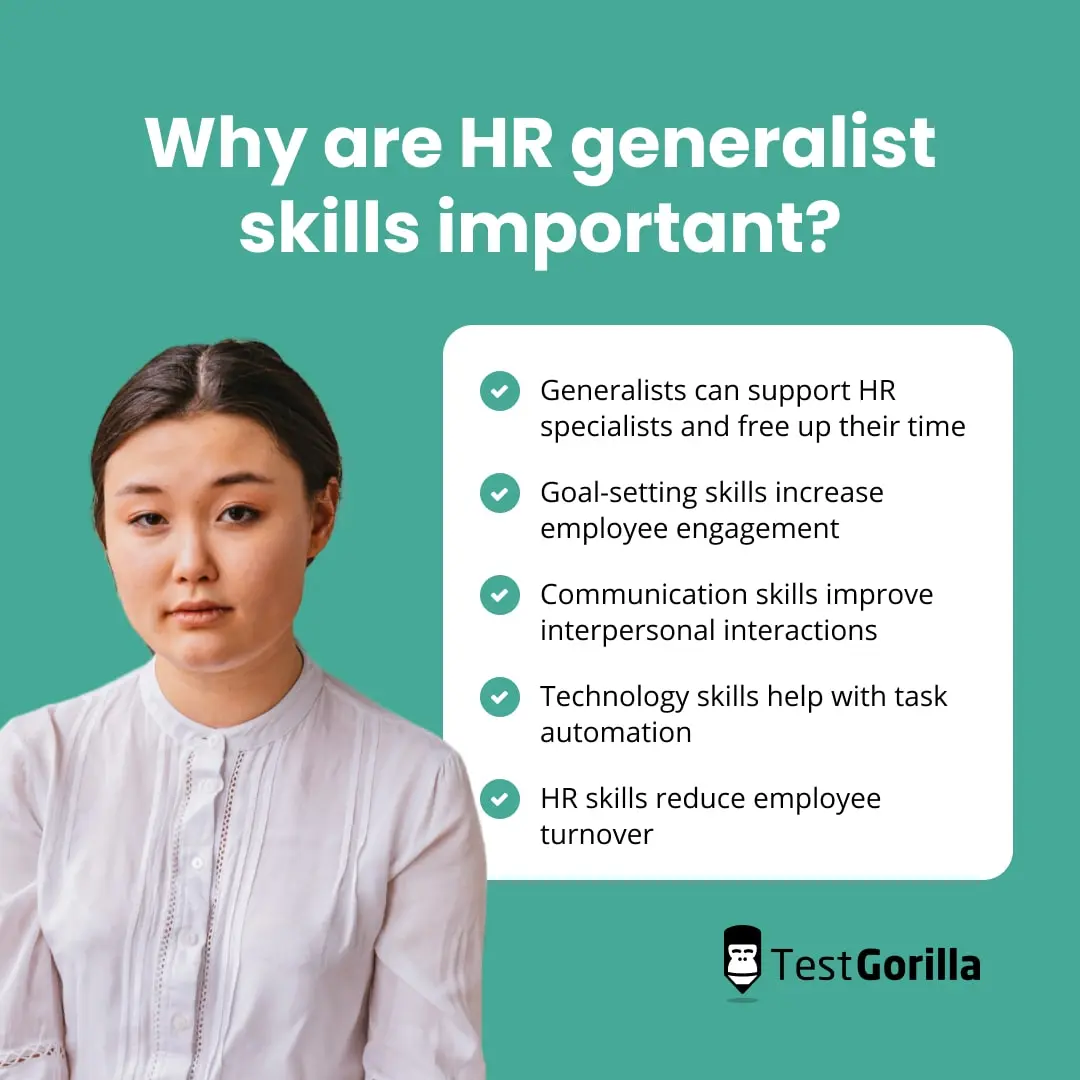When it comes to staffing your company’s HR department, hiring for an HR generalist position can be more challenging than finding a specialist because generalists typically require a broader scope of knowledge and thus require the evaluation of a wider skill set.
This skill set is crucial to your HR generalist’s success in the role. A new hire with the appropriate mix of HR skills will be able to support your company’s growth by handling important recruitment needs like candidate sourcing, training, and onboarding.
Fortunately, evaluating your candidate pool can be made easy with skills assessments like TestGorilla. Comprised of relevant tests like our HR Fundamentals skills test, an assessment can help you quickly find the appropriately skilled candidates for your role. Let’s explore why HR generalist skills are so important and what you should look for when recruiting a new hire.
Table of contents
- What is an HR generalist skills assessment?
- Why are HR generalist skills important?
- Which skills and traits are important for HR generalist roles?
- Skills and traits test
- HR generalist skills assessment FAQs
- How TestGorilla can help you find a skilled HR generalist
- Assess HR generalist skills with TestGorilla
What is an HR generalist skills assessment?
Using skills tests to create a broad HR generalist assessment can help you evaluate the following skills:
Employee relationship management
Conflict mediation
Organizational effectiveness
Hiring and onboarding
This method also helps you assess your candidates’ traits, personality, culture, and cognitive ability, helping you understand their thinking process when supporting and communicating with HR team members and others.
TestGorilla’s in-depth assessments can combine up to five tests and 20 custom questions. Our platform uses percentages and star rankings to calculate and identify who in your talent pool performs the best on your assessment, making candidate comparisons simple.
Using an HR generalist assessment ensures you select candidates with the right mix of skills that align closely with the role’s requirements.
Why are HR generalist skills important?
The specific skill set of a successful HR generalist can help your company in many ways. Here are five main reasons these skills are important for your business and employees:
1. Generalists can support HR specialists and free up their time
HR generalists with a broad skill set can support HR specialists and teams across various tasks, freeing up the specialists’ time and giving your HR department flexibility in how it functions.
For instance, if an HR specialist needs support handling recruitment strategies, an HR generalist can step in to help streamline processes.
2. Goal-setting skills increase employee engagement
Goal-setting skills enable HR generalists to teach employees how to set achievable goals, ensuring teams stay engaged and focused on progression.
For example, HR generalists may discuss the specific, measurable, achievable, realistic, and timely (SMART) goals your company’s employees need to achieve. This action provides a structured approach to goal setting. Such skills may be particularly important if there is a requirement for your HR teams to work with senior and mid-level managers, who may need to set and measure goals at various levels of your company’s hierarchy.
3. Communication skills improve interpersonal interactions
Communication skills like active listening ensure HR generalists can handle interactions with job seekers, employees, and managers alike.
Verbal and non-verbal communication make liaising with these individuals easier, helping HR generalists resolve employee issues. For example, they can actively listen to challenges, like training difficulties or managing hybrid work, and propose ways to solve them. They can achieve this by verbally discussing the information they gather on these challenges, preparing a plan, and exploring the potential outcomes of their strategy.
This means your employees, job seekers, and managers will receive the right information needed to perform their roles to their fullest potential. For example, new hires will be set up with the appropriate training and employees can better navigate hybrid work challenges thanks to effective communication.
4. Technology skills help with task automation
Technology skills help HR generalists complete HR processes faster. If they have skills in using human resources information management systems (HRIS) and applicant tracking software (ATS), they can automate manual duties.
For instance, technical skills help HR generalists streamline tasks like job posting, resume scanning, and managing candidates. Technological adaptation also means there’s less human error when HR generalists process job applications.
The best effect of these skills is giving HR generalists extra time to complete other duties like onboarding. If your candidate can effectively use HR software, they may be an excellent fit because they can dedicate time to hands-on duties like supporting your company’s employees with empathy. They’ll be able to better focus on providing the human touch that contributes to a successful HR department.
5. HR skills reduce employee turnover
HR skills in onboarding and training help HR generalists reduce employee turnover. These skills are key in helping them ensure new hires integrate well into your organization.
For example, candidates can use their skills to create engaging onboarding journeys and activities. They can decide which elements the onboarding activities should feature in order to educate new hires about your company’s culture, mission, and structure.
They can also work with hiring managers to plan and refine compelling hiring and onboarding processes, leading to more successful hiring outcomes. This is also a process that our data-driven platform can support you with, helping you align your candidate onboarding process according to their specific skills.
With the help of excellent HR skills, your HR generalist can better prime new hires to adjust well to their new environment, thereby reducing attrition.
Which skills and traits are important for HR generalist roles?
Several skills and traits can make a difference to how well HR generalists perform in their roles. Having explored why HR generalists need such a broad skill set, let’s now consider the specific skills your candidates should have in their toolbox to succeed.
1. Problem solving
Problem-solving skills involve resolving complex challenges by breaking them down into easier ones. Candidates with problem-solving skills will be able to:
Apply logical thinking to make decisions
Analyze information to draw conclusions
Create schedules to resolve the problems
For example, an HR generalist can use their problem-solving ability to develop retention strategies and hang onto your company’s high-performing employees.
2. Analytical skills
Analytical skills involve deconstructing information and evaluating it to draw conclusions. Some specific skills that are part of analytical abilities include being able to:
Look at and use metrics
Use data to make decisions
Pay attention to detail
An HR generalist might use their analytical skills to narrow a candidate pool. For example, they could analyze each candidate’s credentials to determine who has the best skills for the role. They may also use these skills to remove candidates whose abilities don’t match the requirements.
3. Time management
Time management involves completing work to agreed-upon deadlines and managing tasks efficiently. Some specific abilities that are crucial for time management include:
Task prioritization
Strategy planning to complete challenges
Reflecting on the task results to optimize processes
HR generalists can use time management skills to achieve things like juggling recruitment, onboarding, and candidate sourcing. They should consider how long these tasks will take and allot specific time for each. This skill helps them stay productive and achieve each hiring task while reducing time-to-hire metrics.
4. Onboarding skills
Onboarding skills include evaluating each new hire’s performance and teaching new hires about the company culture. It also involves skills such as:
Relationship management
Training expertise
Payroll administration
For instance, HR generalists could use these skills to create onboarding checklists and ensure new hires quickly hone any necessary new skills. Along with clear and consistent communication ability, being skilled in onboarding helps your HR generalist set your new hires up for success so they can perform their duties effectively from day one.
5. Conflict resolution
Conflict resolution skills include diffusing tension and enhancing communication between employees. They also involve:
Mediating disagreements
Creating inclusive workplace policies
Looking for ways to find common ground
Training employees to use conflict resolution methods
The HR generalist you hire should be able to use conflict resolution skills to resolve disputes such as task-related disagreements. They can use these skills in mediation by asking open-ended questions and being empathetic, which helps employees feel more comfortable sharing their concerns.
Conflict resolution skills also help create a safe space for employees to share more about their challenges, ensuring everyone is on the same page and working harmoniously.
6. Administrative skills
Administrative skills can help keep your HR department running smoothly, and cover the following abilities:
Written communication skills
Verbal communication skills
Multitasking and prioritization
One way HR generalists might use these skills is when managing candidate applications in applicant tracking systems. For instance, they could update candidate-related information in the system to track their applicants’ progress throughout the hiring process. This way, they have access to all the information required to make a hiring decision right at their fingertips, making the recruitment process significantly smoother.
7. Project management skills
Project management skills involve estimating project schedules and managing project work. It also involves the following skills:
Project budget estimation
Communication during the entire project lifecycle
Team project and schedule management
Project management is exceptionally important for an HR generalist, as they are expected to work on several projects simultaneously.
For example, an HR generalist might be in charge of planning a company retreat in addition to their typical responsibilities. In this case, they would use their project management skills to estimate the retreat budget, communicate with the company to provide all the pertinent information, and organize it from start to finish.
Since they work on multiple tasks at once, support multiple teams, and need to regularly reassess priorities, a great HR generalist should be well-versed in managing themselves and their time effectively.
Skills and traits test
We have a broad range of skills and traits tests available in our test library that you can use to create an assessment and evaluate your candidates’ skills.
Read on for the list of tests we recommend considering when you make your HR generalist assessment.
1. HR Fundamentals test
The HR fundamentals skills test assesses basic HR expertise. It will tell you if your candidates have skills in:
Relationship management
Business acumen for recruitment
Consultation and offering guidance
This test is a great choice if you need to find candidates who can ensure your HR department, employee, and company goals align.
2. Time management test
Our Time management skills test evaluates your candidate’s ability to manage time efficiently. It will reveal the candidates who can:
Prioritize tasks
Plan toward task completion
Implement plans for task completion
The results of this test will show whether candidates can be productive and work in accordance with deadlines.
3. Problem solving test
The Problem solving skills test assesses whether candidates can define problems and review data to make the best business choices. With the help of this test, you can identify candidates with the following skills:
Data interpretation
Applying logic when responding to complex situations
Decision-making abilities
Candidates who perform well on this test can break a problem into solvable parts and execute plans to solve each problem.
4. Attention to detail test
Our Attention to detail test checks if candidates can complete complex processes with analytical skills. You can use this test to screen candidates for following skills:
Information filtering
Skills in comparing statements and information
Ability to check the consistency of information
This test is an excellent tool to determine if your candidates will be able to keep track of the minor details when completing HR responsibilities for your company.
5. Leadership and people management test
Our Leadership and people management test helps determine if candidates can lead others in your business. It reveals whether candidates can:
Make plans to support the team’s development
Provide guidance and feedback
Delegate task responsibilities
Use this test to learn which candidates can align their team members’ skills with your organization’s goals and coach them to achieve their aspirations.
6. Motivation test
Our Motivation skills test evaluates whether your candidates’ preferences align with your company's values. It also shows if your candidates’ values match:
The key elements of your workplace
The job activities
The extrinsic factors that impact motivation
Include this test in your HR generalist assessment if you’d like to learn which factors motivate or demotivate your candidates.
8. Communication test
The Communication skills test assesses your candidates’ verbal and non-verbal communication competencies. It specifically looks into their ability to:
Understand written communication
Use active listening
Use professional etiquette when sharing information
Summarize messages
Choose this test as part of your assessment if you need to know whether candidates can be attentive when listening to others, communicate effectively in writing, and use grammatically correct information in written documents.
HR generalist skills assessment FAQs
If you’d like more information on using an HR generalist assessment in your hiring process, read through our responses to frequently asked questions below.
How do you create a skills assessment for HR generalists?
You can easily create an HR generalist skills assessment by searching for the job role in the TestGorilla platform and choosing from the various relevant skills tests we offer. Select up to five tests to comprise your assessment, and then you can add up to 20 custom questions for more extensive testing. Our platform also lets you customize your assessment visually with your company’s logo and color theme.
What custom questions should be included in the assessment?
There are many ideal custom question types for an HR generalist assessment. You might want to ask candidates to support their application by providing evidence through a file-upload style question. Or, you can use essay-style questions to ask candidates for written responses to specific scenario-based questions.
If you’re feeling stumped, you can explore prewritten custom questions from our test library.
How do you check HR generalist assessment results?
Our assessments display your candidates’ results as percentages and star rankings. The platform will rank them for you on an assessment overview page. You’ll also be shown the time candidates took to complete all the tests. TestGorilla allows you to download these results as a PDF, XLSX, or CSV file.
When should you use an HR generalist assessment?
The best time to administer an assessment to candidates is after sourcing and before the interview phase. Invite your HR generalist candidates to take the assessment as soon as they apply. You’ll then be able to check the results from the overview page and choose the candidates with the highest performance to invite to the interview phase.
How are HR generalist assessments ideal for training new hires?
An assessment for HR generalists can make onboarding easier. With the results of each test, you can determine which skills and training methods you need to work on and offer to new hires. For instance, if you see that candidates don’t have the necessary skills in training employees, you may use these insights to organize the appropriate shadowing opportunities for them.
How can you invite candidates to take an HR generalist assessment?
Choose one of three methods to invite candidates to take your assessment: You can send an invitation via email, manage the invitation through an applicant tracking system, or use the TestGorilla platform. You can send several invites at the click of a button.
How TestGorilla can help you find a skilled HR generalist
It can be tricky to screen a pool of candidates and find the best HR generalist for your company.
TestGorilla’s many benefits make recruitment simpler, from objective, unbiased candidate shortlisting to choosing and onboarding your new hire.
Here are some perks of using TestGorilla in your recruitment process:
1. Access personality and culture tests
With TestGorilla, you can include personality and culture tests in your assessments to reveal more about your candidates’ traits and values. This can help you foresee which qualities your HR generalist will bring to your team and make a more informed hiring decision.
2. Reduce unconscious bias
You can hire without unconscious bias by using TestGorilla. Our tests provide statistics that point you in the direction of skilled HR generalists without making a decision based on personal characteristics. This means you can bypass the need for guesswork to estimate how a candidate will perform in the role or determine who has the most relevant skill set
3. Assess specific knowledge with custom questions
When you add custom questions to your assessment, you can gauge specific HR knowledge more deeply.
Take advantage of custom questions to gain role-specific information or additional clarity on important topics. For example, you might ask specific questions about your candidates’ communication skills to determine if they’ll be a match to your role’s unique requirements.
4. Prevent dishonesty
When candidates take your assessment, you will receive automatic snapshots of them working. This anti-cheating feature will also alert you if candidates close the full-screen mode. This ensures transparency during the testing process, so you’ll hire candidates on their true capabilities and avoid mis-hiring.
Assess HR generalist skills with TestGorilla
To improve your recruitment process and generate a shortlist of only the most qualified HR generalist candidates, get started by creating a skills assessment in the TestGorilla platform.
You’ll find many different test types to choose from in our library, such as cognitive ability, culture, and situational judgment tests. Include the maximum five tests in your assessment to receive the most data for your candidate evaluation process.
We’ve supported more than 10,400 companies with their recruitment. Check out our case studies to see how we’ve helped businesses improve and scale their hiring process.
Sign up for TestGorilla and find the most skilled HR generalist to grow your company. Register for a free demo to learn more.
Related posts
Hire the best candidates with TestGorilla
Create pre-employment assessments in minutes to screen candidates, save time, and hire the best talent.
Latest posts
The best advice in pre-employment testing, in your inbox.
No spam. Unsubscribe at any time.

Hire the best. No bias. No stress.
Our screening tests identify the best candidates and make your hiring decisions faster, easier, and bias-free.
Free resources
This checklist covers key features you should look for when choosing a skills testing platform
This resource will help you develop an onboarding checklist for new hires.
How to assess your candidates' attention to detail.
Learn how to get human resources certified through HRCI or SHRM.
Learn how you can improve the level of talent at your company.
Learn how CapitalT reduced hiring bias with online skills assessments.
Learn how to make the resume process more efficient and more effective.
Improve your hiring strategy with these 7 critical recruitment metrics.
Learn how Sukhi decreased time spent reviewing resumes by 83%!
Hire more efficiently with these hacks that 99% of recruiters aren't using.
Make a business case for diversity and inclusion initiatives with this data.


















